
Jamie is the co-founder of The Kind Friend, a wellness company that aims to help people live a more mindful life through uplifting content, mindfulness journals and a like-minded community.
The Kind Friend also partners up with movements like The Kindness Movement Singapore, MNCs and influencers across the globe to promote wellbeing, kindness and self-care for the wider community.
Previously she was the regional partnerships lead at Carousell and founded two education businesses in Australia. In her leisure time, she enjoys reading and engaging in conversations with someone who inspires her to expand her knowledge.
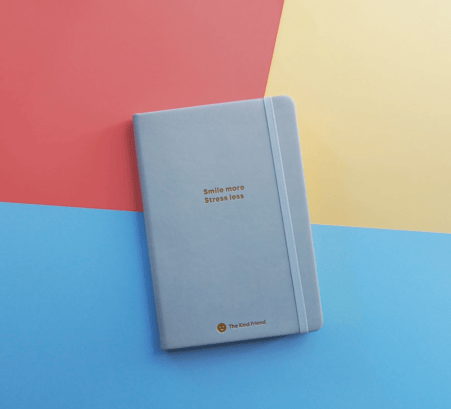
People with lower levels of anxiety show higher emotional control and resilience. Simply writing down feelings and concerns to gain control of emotions can lead to improve mental health and reduce anxiety. With The Kind Friend, Jamie wanted to combine mindfulness and creativity in one tool to develop self-awareness.
We are experiencing a global crisis, and feeling anxious or unproductive is normal in this context. Journaling helps reflecting on daily life, identify negative thoughts and better control them.
Plan out week by settings goals, tracking tasks, reflecting on your feelings and cultivating gratitude to develop practice of self-awareness.
By regularly keeping track of all of the things you are thankful, you will naturally feel more grateful, and start feeling happier. Studies show that if you express gratitude, it raises your happiness by 25%.
During crisis, it is easy to feel overwhelmed. Sometimes, all it takes is a small act like showing gratitude or sharing appreciation to put everything else into perspective. A gratitude journal will allow you to always refer back to positive thoughts and feel more positive emotions.
Gratitude and appreciation can be cultivated and utilised within organisations or teams to improve welfare - especially in a context of social distancing. 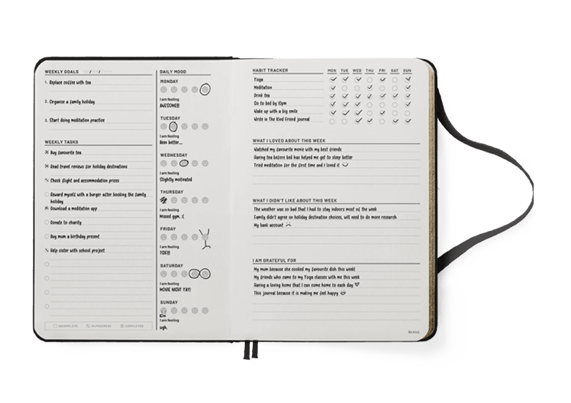
The Kind Friend journal includes 26 weekly templates with goal tracking, task tracking, daily mood tracking, habit tracking and a section for gratitude
1- Understand your why and commit.
2- Set a time each day to make it a habit (eg. morning or before bedtime).
3- Start small: Write down three things you are grateful for.
4- Let go of rules.
5- Expand: Find fun prompts.
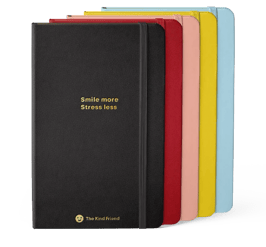
Visit https://www.thekindfriend.com to learn more about The Kind Friend, and 10% off any purchases.
Use the code: KINDNESSNOW
● Rose, Rose, Thorn, Bud (the more specific it is, the better the outcome)
● Write down exactly what’s going on in your head right now, then write about how you would like things to feel and be in your head
● Describe the last time you literally couldn’t stop laughing. What was so funny? Explain it in great detail and remember the joy you felt at the time
● List out everything you are worrying about right now. Now go through the list and write how you can make each item easier, less scary and less anxiety-producing
● List out ten accomplishments in your life and which one you are most proud of
● Write about all the different ways you can bring happiness to other people’s lives. For a casual acquaintance, your spouse, a family member, a friend; what little (or big) things can you do to bring more joy into their lives?
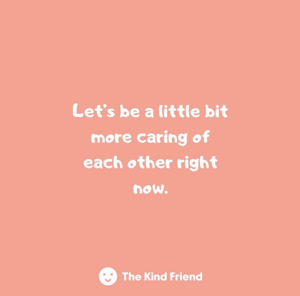
With more than 66,000 followers, the Kind Friend share nice things to brighten up your day and we have a beautiful journal for your well-being.
Receive tips on how to look after yourself and others around you.
- Atomic Habits by James Clear
- The Power of Habit by Charles Duhigg
- Shoe Dog by Phil Knight
- Mindset by Carol Dweck
- Tribe of Mentors by Tim Ferris
- The Happiness Lab Podcast by Dr Laurie Santos
- Work Life Podcast by Psychologist Adam Grant
- Be Grateful More Often by Francesca Gino - HBR
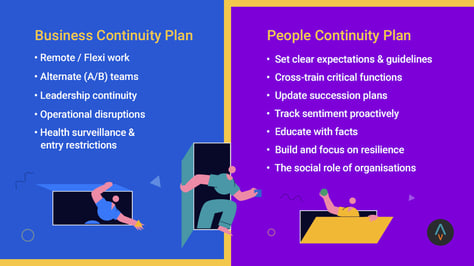
While a BCP is focused on bringing operational processes set in place, a People Continuity Plan focuses on developing an environment that is supportive of your employee's emotional health, as well as developing procedures to manage critical business functions from
Here are some resources for building psychological resilience for your teams, developing your people strategy and introducing succession planning for your teams.

We’ve analysed over thousands of employee answers from companies of all sizes and industries in Singapore to dig into the factors that are impacting employee well-being and engagement through this crisis and beyond.
Learn more about our findings here.

 .
. 
Copyright © 2025 EngageRocket Pte Ltd. All rights reserved unless otherwise stated.